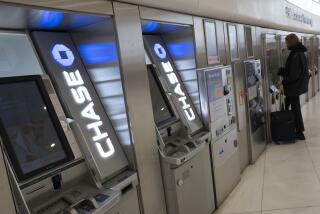Funds Draining Into Other Accounts : Future Looks Bleak for Passbook Savings
- Share via
NEW YORK — As the new year starts, the future looks bleak for that old financial mainstay--the passbook savings account.
Time was, not so long ago, that many Americans’ financial hopes and dreams reposed in these pocket-sized documents, which often came symbolically as well as physically shielded from the elements in clear plastic jackets.
Over the last decade, however, changing economic, political and technological circumstances have turned passbook accounts into a laughingstock.
Money Poured Out According to Federal Reserve Board figures compiled by Donoghue’s Moneyletter, a newsletter on personal finance, $18.2 billion poured out of passbook accounts between Oct. 31, 1983, and Oct. 31, 1984.
That showing contrasted with healthy increases in the passbook accounts’ more “modern” competitors, like certificates of deposit, money-market deposit accounts (known as MMDAs), and money-market mutual funds. The MMDAs, which made their first appearance only two years ago, amounts to $386.8 billion, surpassing the $295.8 billion in passbook accounts.
The trend is expected to continue this year, especially since the minimum balance that institutions can set for MMDAs to earn market interest rates was lowered as of Jan. 1 from $2,500 to $1,000.
However, there is another way to look at the fortunes of the passbook savings account. Despite its glaring flaw--a 5.5% maximum interest rate--it has held on stubbornly to a place in the financial firmament.
Its persistence is attributable at least partly to ignorance, indifference and procrastination among savers who could get a better return in many other types of accounts. These factors have restrained the decline of passbook accounts without giving much promise of reversing it.
Still, there is a chance that the passbook account will stage a comeback in the future, perhaps in a modified form.
To Be Deregulated As of Jan. 1, 1986, all savings accounts will be fully deregulated. Banks and other deposit-taking institutions will be free to pay whatever interest rate they wish on accounts of any size.
Will they rush to seize this opportunity, to put passbook accounts on a competitive basis, paying money- market interest? The answer depends on many variables, including the degree of intensity with which savers demand such a change.
Bankers naturally don’t want to pay more for your money than they have to. Their job, in essence, is to obtain funds as cheaply as possible to lend out for a profitable return.
Many institutions have balked so far at lowering their MMDA minimums from $2,500 to $1,000. It remains to be seen whether market forces will constrain them to do so.
Savers themselves represent an important part of those market forces. Money Fund Safety Ratings, an advisory service, urges a militant position on this point.
Increases Flexibility “We recommend withdrawing your money-market account from any bank or thrift that fails to move to the new $1,000 minimum,” the service says.
“The lower minimum significantly increases your flexibility. It also reduces the risk of accidentally falling below an institution’s required minimum and triggering penalties that include loss of interest.”
Next winter, a similar expression of demand by savers could bring about the rebirth, in one form or another, of the passbook savings account.
More to Read
Inside the business of entertainment
The Wide Shot brings you news, analysis and insights on everything from streaming wars to production — and what it all means for the future.
You may occasionally receive promotional content from the Los Angeles Times.









